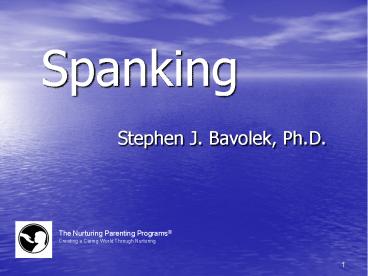Spanking Stephen J. Bavolek, Ph.D. - PowerPoint PPT Presentation
Title:
Spanking Stephen J. Bavolek, Ph.D.
Description:
Corporal Punishment was negatively correlated with the cognitive stimulation that the parents provided to the child. * Beal, M.D., Villarosa & Abner ... – PowerPoint PPT presentation
Number of Views:90
Avg rating:3.0/5.0
Title: Spanking Stephen J. Bavolek, Ph.D.
1
Spanking Stephen J. Bavolek, Ph.D.
The Nurturing Parenting Programs Creating a
Caring World Through Nurturing
2
Spanking
- Remember childhood spankings?
- Why were you spanked?
- What were your parents trying to teach you?
- What did you learn?
- If you spank as a parent, why?
3
Gallup Poll on Spanking
- 1964
- 94 of parents approved of spanking
- 2004
- 68 of parents approved of spanking
4
Straws (2001)
- Corporal Punishment is likely to have an opposite
and undesired effect. - rather than reducing inappropriate behavior,
Corporal Punishment is likely to teach that
physical aggression is a normative and
appropriate way to solve conflicts.
5
Recent Research Findings
- The effect of Corporal Punishment on anti-social
behavior is linear. - Corporal Punishment does not deter anti-social
behavior but rather may increase it. - Lower levels of Corporal Punishment may have as
negative an impact as higher levels.
6
Simons (1994)
- Corporal Punishment was negatively related to
quality of parent involvement -- the less time
spent with children, the more frequent use of
Corporal Punishment. - Corporal Punishment was negatively correlated
with the cognitive stimulation that the parents
provided to the child.
7
Beal, M.D., Villarosa Abner (pages 124-125)
- Black women are more likely to spank children
than White women. A Florida study of nearly
20,000 parents confirmed the hypothesis. - Authors advice Dont ever spank your child.
8
Rosemond To Spank or Not to Spank (1994)
- Be quick about it.
- Do not spank as a last resort.
- Spank in anger.
- Use your hand.
- Apply hand to the childs rear end.
- Follow through with a clear, stern message and if
need be, restrictive consequences. - Spank only in private.
- Spank only occasionally.
9
Sears, M.D. Sears, R.N. Spanking (1995)
- Examine your motive for spanking.
- Spank soon after the offense.
- Help the child accept the spanking.
- Explain why you are spanking.
- Encourage a confession.
- Choose a proper instrument (switch).
- Follow up after spanking with prayer.
10
Sears, M.D. Sears, R.N. Discipline Book (1995)
- Ten Reasons Not to HIT
- Hitting models hitting.
- Hitting devalues the child.
- Hitting devalues the parent.
- Hitting may lead to abuse.
- Hitting does not improve behavior.
- Hitting is NOT Biblical.
- Hitting promotes anger in both parents
children. - Hitting brings back bad memories.
- Spanking has long-term effects.
- Spanking doesnt work.
11
Sears, M.D. Sears, R.N. Christian Parenting
Child Care (1997)
- When Not to Spank
- Do not spank in anger.
- Do not spank toddlers and young children.
- Do not spank if you have a weak parent-child
relationship.































